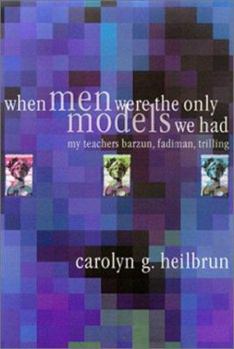When Men Were the Only Models We Had: My Teachers Fadiman, Barzun, Trilling
Select Format
Select Condition 
Book Overview
When Men Were the Only Models We Had My Teachers Fadiman, Barzun, Trilling Carolyn G. Heilbrun "Heilbrun's engaging memoir evokes a bygone era of intellectual life, when clarity of language and exacting prose marked lively critical conversations on politics, society, and literature."--Library Journal When Men Were the Only Models We Had is a loving, admiring, but stringent account of youthful enthusiasms, of the romance of ideas, of the intellectual brilliance of three unwitting mentors, and of the hopelessness of female ambition in the years before the feminist movement of the last three decades of the last century. And it is, in the end, a book that offers splendid proof that the models we once had are no longer the only ones before us. Carolyn G. Heilbrun, Avalon Professor in the Humanities Emerita, taught at Columbia for 33 years. She is the author numerous books, including Toward a Recognition of Androgyny, Writing a Woman's Life, and The Last Gift of Time. As Amanda Cross, she is author of twelve best-selling novels featuring the detective Kate Fansler. Personal Takes 2001 168 pages 5 1/2 x 8 1/2 ISBN 978-0-8122-3632-3 Cloth $32.50t 21.50 World Rights Women's/Gender Studies, Education, Literature Short copy: "A study of the influences of Clifton Fadiman, Lionel Trilling, and Jacques Barzun on Heilbrun's own literary development, but the book is far broader than that--really, a history of Columbia University in the turmoil of the sixties and beyond. And this isn't for women only "--Maxine Kumin, Ploughshares
Format:Hardcover
Language:English
ISBN:0812236327
ISBN13:9780812236323
Release Date:September 2001
Publisher:University of Pennsylvania Press
Length:168 Pages
Weight:0.90 lbs.
Dimensions:0.8" x 5.9" x 8.9"
Customer Reviews
1 rating
tragedy is what most marks us if we are thinkers ...
Published by Thriftbooks.com User , 19 years ago
Since I took a graduate seminar course in women's memoirs in American literature, I have read several books by Heilbrun. As I was not going to specialize in autobiography/memoirs or in feminist theory, I read her more as a writer than a scholar or theorist, focusing more on how she says things than on what. In this regard, I enjoyed every book I read because her language was something unique. It is clear and concise, without being simple, authoratitive without being pedantic, seemingly aloof yet strangely persuasive. If passion is another name for talent, she is very, very passionate, but that passion is moderated with a unique kind of resignation (or perhaps, wisdom). This book is not my favorite, and compared to other titles such as Writing Women's Lives, it does indeed gets slow and heavy here and there. There are parts where even those in the same line of work as Heilbrun's would go, "Who cares?" or "Why bother?" Yet, largely, it is accessible and *fun*. Read as an intellectual memoir, it is a story about how Heilbrun was gratefully influenced by three men, how she resisted and embraced their influence, and how she finally grew out of it. There are many interesting anecdotes coming from her encounters with these men (Barzun, Fadiman, and Trilling) and her life as a graduate student in the 50s at one of the most highly regarded universities in the US. Students of today would gasp at the nightmarish inconvinience of having only two copies of their papers, and painfully taking turns in reading other student's papers due to the lack of copies. Heilbrun devoted a chapter to Diana Trilling, which wasn't her plan when he planned on the book. She was fascinated and gained admiration for her in the process of research for the book, and readers would clearly see why in the chapter on her. In sum, according to Heilbrun, Diana Trilling is a woman whose insights on her life come largely from feminism ("the most successful revolution of our century," Trilling herself called it), yet who was not herself a feminist. She accepted a life of belittlements from others, while having penetrating understanding of those belittlements. Early in the book, Heilbrun notes that perhaps one of the most palpable influences she got from Lionel Trilling would be the notion that "tragedy is what most marks us if we are thinkers." This is what Trilling shares with Freud, and this is what Heilbrun shares with Trilling, despite her distrust of Freud, and to some extent, of Trilling as well. This comment comes after an anecdote about Trilling's inspiring lecture on Henry James, from which young Heilbrun took the idea that "the essence of literature was in the tensions of the thinking life." This part of the book is strangely moving, and makes me think hard about the interplay among "tension," "thinking life," "tragedy," and "literature." A small and not really an ambitious book, but contains much fun and insights.






